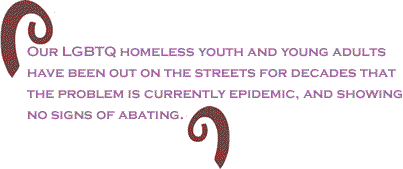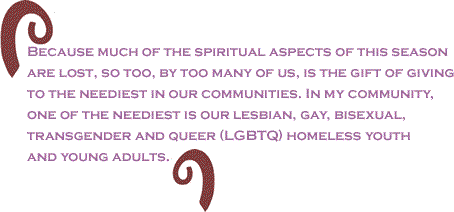| The
holiday season is a difficult time of year many of us.
Our
culture’s egregious forms of commercialism always bother
me -- and its anemic recognition of other celebratory forms
of this holiday season other than Christmas, like Hanukkah,
Kwanzaa, Ramadan, and the celebration of the winter solstice.
Too
often we see the glitz and glamour that this holiday brings
and we have totally missed its spiritual message.
And
because much of the spiritual aspects of this season are
lost, so too, by too many of us, is the gift of giving to
the neediest in our communities. In my community, one of
the neediest is our lesbian, gay, bisexual, transgender
and queer (LGBTQ) homeless youth and young adults.
And,
unfortunately, our LGBTQ homeless youth and young adults
face the annual angst of searching for home for the holidays.
"I'm
Queer. I'm Homeless. I'm Hungry. I'm Scared. I'm Tired,"
is the ad put out this year by New Alternatives for
LGBT Homeless Youth asking us to give the gift of $10
this holiday season to help our homeless.
"Every
night, thousands of lesbian, gay bisexual and transgender
youth and young adults are homeless in New York City. Whether
they have been kicked out by homophobic families, forced
to flee conservative communities, aged out of foster care,
or come from families torn apart by poverty, AIDS, drug
abuse or eviction, these youth sleep in the City’s parks,
on the subway, and in public facilities such as Port Authority
and Penn Station." New Alternatives for
LGBT Homeless Youth website reminds us.

New
Alternatives for LGBT Homeless Youth is based in NYC and
was founded in October 2008 by a group of volunteers and
professionals with experience working with homeless LGBTQ
youth in various shelter and transitional housing settings. And
they are always looking for our help and gift-giving annually,
but especially around the holidays.
This
Thanksgiving, New Alternatives youth and volunteers attended
a dinner at Tom Colicchio’s Craft restaurant in NYC, and
they had an opportunity to meet actress Julianne Moore,
who was also volunteering at the event.
This
year, the New Alternatives Team is asking the community
to "Be a Gay Santa!" They are looking for
150 Santas for this holiday season to receive a letter
written by a homeless LGBTQ youth requesting a gift (requests
are limited to items of $100 in value or less).

Our
LGBTQ homeless youth and young adults have been out on the
streets for decades that the problem is currently epidemic,
and showing no signs of abating.
In
2006, the National Gay and Lesbian Task Force and the National
Coalition for the Homeless released a report that found
that up to 42 percent of the nation’s homeless youth identify
as lesbian or gay. That means, of New York City’s estimated
15,000 to 30,000 homeless youth population of that year,
about 6,300 to 12,600 are LGBTQ, and approximately
90 percent within this group comprise of African American
and Latino youth.
As
a matter of fact, in June 2006 the Ali Forney Center (AFC),
in NYC, the nation's largest LGBTQ youth homeless services
center, aggressively launched an advertising campaign
asking the simple question: "Would you stop loving
your child if you found out they were gay or lesbian?"
Carl Siciliano, Executive Director of the Ali Forney Center, stated,
"Our goal was to address the rising rate of LGBT youth
homelessness, particularly in communities of color."

And
despite the fact these kids looked to their Christian churches
for help these youth have neither a chance nor a prayer
for assistance.
Although
this holiday season, for Christians, is mostly thought of
in terms of feasting and celebrating Jesus' birth, let's
not forget that Jesus’ birth comes at difficult time along
the human timeline for acceptance. Viewed as a religious
threat to conservative Jews because of his iconoclastic
views and practice of Jewish Law, and viewed as a political
threat to the Roman government simply because he was a Jew,
Jesus was nailed to a cross at Calvary because of ethnic
and religious intolerance.
Similarly,
when I think of the birth of Jesus in light of how Christians
celebrate this holiday season one of the themes that looms
large for me is LGBTQ homelessness.
Why
homelessness?
Because
many of our LGBTQ youth, myself included as once a homeless
youth, did not really have a home to go to where they can
sit at the family table and be fully out -- or if out, fully
accepted. As with Mary and Joseph, Jesus' parents, during
the time of his birth who traveled from inn to inn
to only find there was no welcome space for them, LGBTQ
youth live nomadic street lives, traveling from place to
place to sadly find out there is neither room nor space
nor home nor family to be permanently welcome them into.

Unfortunately,
many of our homeless LGBTQ youth and young adult across
this country this holiday season will not have a queer-friendly
shelter to go to. And too many will spend the time alone
even where homeless LGBTQ shelters across the country will
be open because they gravely miss their families and communities-
and especially around this holiday.
As
we gear up for this holiday season let us enjoy the time. Let
us make home, if not with biological family, then certainly
with beloved friends. But let us also not forget the
continued struggle of the LGBTQ homeless youth and young
adults searching for home for the holidays.
BlackCommentator.com Editorial Board member, the Rev. Irene Monroe, is a
religion columnist, theologian, and public speaker. She is the Coordinator of the
African-American Roundtable of the Center for Lesbian and Gay Studies in Religion
and Ministry (CLGS) at the Pacific School of Religion. A native of Brooklyn, Rev. Monroe is a graduate from Wellesley
College and Union Theological Seminary at Columbia University,
and served as a pastor at an African-American church before
coming to Harvard Divinity School for her doctorate as a
Ford Fellow. She was recently named to MSNBC’s list of 10 Black Women You Should Know. Reverend Monroe is the author
of Let Your Light Shine Like a Rainbow Always: Meditations on Bible
Prayers for Not’So’Everyday Moments. As an African-American feminist theologian, she speaks for
a sector of society that is frequently invisible. Her website is irenemonroe.com.
Click here to contact the Rev. Monroe.
|

